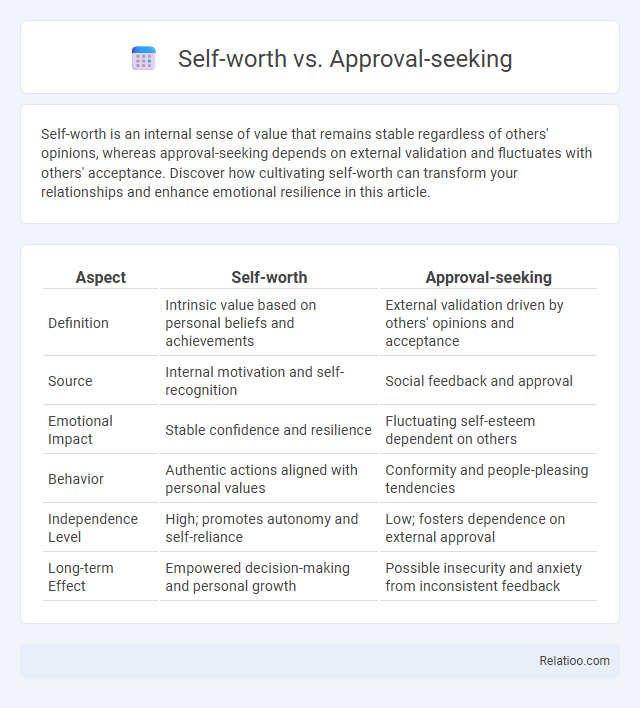Self-worth is an internal sense of value that remains stable regardless of others' opinions, whereas approval-seeking depends on external validation and fluctuates with others' acceptance. Discover how cultivating self-worth can transform your relationships and enhance emotional resilience in this article.
Table of Comparison
| Aspect | Self-worth | Approval-seeking |
|---|---|---|
| Definition | Intrinsic value based on personal beliefs and achievements | External validation driven by others' opinions and acceptance |
| Source | Internal motivation and self-recognition | Social feedback and approval |
| Emotional Impact | Stable confidence and resilience | Fluctuating self-esteem dependent on others |
| Behavior | Authentic actions aligned with personal values | Conformity and people-pleasing tendencies |
| Independence Level | High; promotes autonomy and self-reliance | Low; fosters dependence on external approval |
| Long-term Effect | Empowered decision-making and personal growth | Possible insecurity and anxiety from inconsistent feedback |
Understanding Self-Worth: Core Principles
Self-worth is an intrinsic sense of value independent of external validation, rooted in self-awareness and acceptance. Approval-seeking relies on others' opinions to define personal value, often leading to dependency and decreased self-esteem. Self-validation involves recognizing and affirming one's feelings and experiences internally, fostering resilience and authentic confidence.
What Drives Approval-Seeking Behavior?
Approval-seeking behavior is primarily driven by a desire to gain acceptance and avoid rejection, often rooted in low self-worth or past experiences of criticism and neglect. Your need for external validation may stem from an underlying insecurity, where self-validation feels insufficient or unattainable. Understanding this dynamic allows you to shift focus towards building intrinsic self-worth rather than relying on others' approval for affirmation.
Self-Worth vs. Approval-Seeking: Key Differences
Self-worth stems from internal recognition of your value, while approval-seeking relies on external validation from others. True self-worth remains stable regardless of others' opinions, whereas approval-seeking behaviors fluctuate based on social feedback. Understanding these distinctions empowers you to build confidence independent of outside approval.
Psychological Roots of Approval-Seeking
Approval-seeking behavior often stems from early experiences of conditional love or inconsistent validation, which create deep-seated fears of rejection and inadequacy. Psychological roots reveal that individuals develop approval-seeking tendencies as a coping mechanism to secure external affirmation when internal self-worth is fragile or underdeveloped. Cultivating self-validation involves recognizing intrinsic value independent of others' opinions, thereby breaking the cycle driven by the need for external approval.
The Impact of Childhood Experiences
Childhood experiences shape your sense of self-worth, often influencing whether you seek approval from others or develop internal self-validation. Consistent praise and emotional support during early years foster self-worth and promote self-validation, reducing reliance on external approval. Conversely, neglect or criticism in childhood can lead to approval-seeking behaviors as a way to compensate for unmet emotional needs.
How Approval-Seeking Undermines Self-Esteem
Approval-seeking behavior often leads to reliance on external validation, which undermines your self-esteem by creating dependency on others' opinions for self-worth. This constant need for approval distracts from genuine self-validation, resulting in a fragile sense of identity and decreased confidence. Building self-worth requires cultivating internal affirmation rather than seeking approval, fostering resilience and authentic self-esteem growth.
Signs You May Be Seeking Approval Too Much
Constantly needing others' praise, feeling anxious without external validation, and changing your behavior to fit others' expectations are clear signs you may be seeking approval too much. Your self-worth becomes dependent on others' opinions, causing emotional distress and preventing authentic self-validation. Recognizing these patterns helps you reclaim self-respect and build a healthier, independent sense of value.
Building Unshakeable Self-Worth
Building unshakeable self-worth anchors Your confidence in intrinsic values rather than external approval or validation from others. Unlike approval-seeking, which depends on others' perceptions, self-worth flourishes through self-awareness and acceptance of Your unique qualities. Prioritizing self-validation cultivates resilience and empowers You to navigate challenges with unwavering self-respect, fostering lasting emotional well-being.
Strategies to Break Free from Approval-Seeking
Breaking free from approval-seeking requires cultivating strong self-worth by recognizing personal values and accomplishments independent of others' opinions. Developing self-validation involves practicing mindful self-reflection, setting clear boundaries, and affirming one's intrinsic qualities through positive self-talk and journaling. Implementing these strategies leads to increased emotional resilience and autonomy, reducing reliance on external validation for confidence and decision-making.
Cultivating Authentic Confidence in Daily Life
Cultivating authentic confidence requires shifting your focus from approval-seeking to nurturing self-worth through consistent self-validation. True self-worth anchors in recognizing your intrinsic value, independent of external opinions or validation. By embracing daily habits that affirm your skills and achievements, you build genuine confidence rooted in self-acceptance rather than external approval.

Infographic: Self-worth vs Approval-seeking
 relatioo.com
relatioo.com